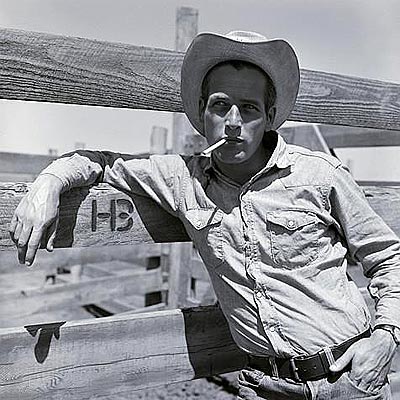
Movies always portrayed cattlemen as married to their life as if it was the only thing they thought about and their life was caught in a time warp of only having a horse or maybe an old pick up truck. Hud shatters that American image of the rancher as married to his land, to a degree. It's like a new generation has come to take the reigns of what once was, even if the old generation wants it to happen or not.
Paul Newman plays the title character, a life long rancher by day and a gigolo by night, drinking and fighting and leaving Mrs. Whoever's house at six in the morning. He lives and works with his father Homer (Melvyn Douglas). Their relationship is as estranged as you can get while living together. There's a definite chill in the air when both are present. Also on the ranch is Hud's teenage nephew Lon (Brandon De Wilde), an impressionable young man who is torn between the influence of his uncle and his grandfather. Patricia Neal plays the housekeeper Alma, a presence that represents the opinion of the opposite sex in a world full of men and causes some sexual tension within the household.
The film begins with one of the herd dying of an unknown ailment that suddenly becomes a dire situation when the fear of foot and mouth disease suddenly becomes a possible reality. Homer is despondent, worrying throughout the film while Hud continues trolling around in his pink Cadillac and drinking and fighting and screwing throughout the town. It's like a morality piece between the old ways and the new ways.
What Hud represents is actually the battle for Lon's soul. Homer shows his grandson that work and dedication are the ways to get where you want in life. Hud's philosophy is to take as much as you can. When the first talk of foot and mouth Hud's plan is to make a quick sell of the cattle and be damned if their sick or not, much to the displeasure of his father. The two are polar opposites with Lon stuck in the middle. The question that this film offers is what path will Lon follow? Is he strong enough to follow his grandfather's example or is Hud to much of an influence on the young boy.
Paul Newman gives a stellar performance as what is essentially the bad guy. Of course he was written as the bad guy, but in an era that was post James Dean and Marlon Brando you can see him as more of a rebel than an opportunist, though it can be said that Brando learned a lesson during the Wild One. Hud learns nothing from start to finish. Melvyn Douglas is Newman's equal as the old and broken down Homer. Homer is still calm and cool, even in the face of everything he's up against. He's old school all the way.
Directed with a great eye for the landscapes by Martin Ritt, the film doesn't let them overtake the film. There are no sweeping John Fordesque Monument Valley shots that become the centerpiece of the film, but there is some terrific landscape that fills in the areas that the actors aren't taking up. It's really a mesmerizing film based on the work of Larry McMurtry, whose work would later show the real life in a Texas town with The Last Picture Show.
Hud is really the first gleam of Paul Newman's excellence as an actor. His portrayal of Hud is a hypnotic piece of acting. Is Hud a bad man? It's hard to say. He could just be like every cattleman's son in Texas. Maybe no one ever fought for his soul?
No comments:
Post a Comment